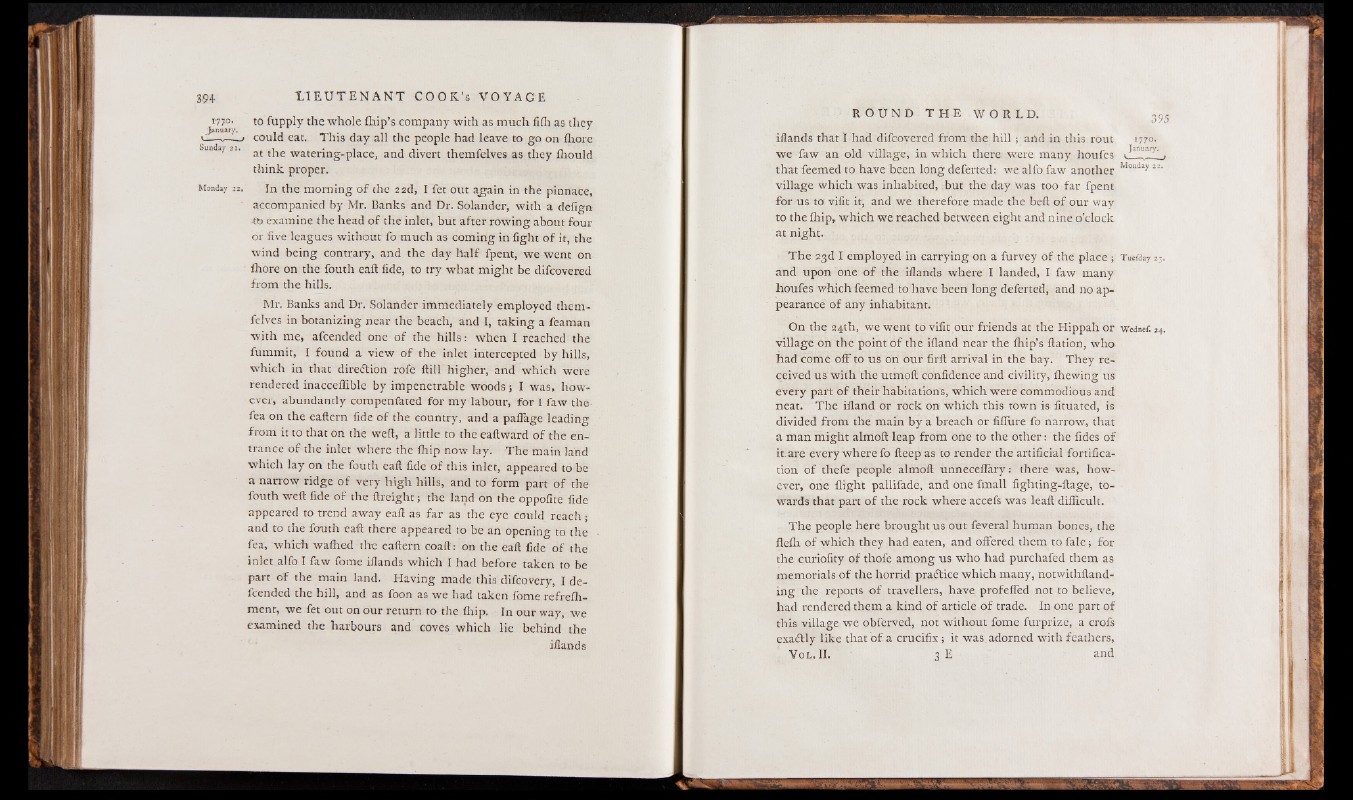
394 XT E U T EN A N T C O O K ’s VOY A GE
•770- to fupply the whole fhip’s company with as much fifli as they
January. . *
c— --- 1 could eat. This day all the people had leave to go on fliore
Sunday 2i. a( ^ watering-place, and divert themfelves as they fhould
think proper.
Monday 22. in the morning o f the 22d, I fet out again in the pinnace,
' accompanied by Mr. Banks and Dr. Solander, with a dcfign
to examine the head o f the inlet, but after rowing about four
or five leagues without fo much as coming in fight of it, the
wind being contrary, and the day half fpent, we went on
fhore on the fouth eaft fide, to try what might be difcovered
from the hills.
Mr. Banks and Dr. Solander immediately employed themfelves
in botanizing near the beach, and I, taking a feaman
with me, afcended one of the hills: when I reached the
fummit, I found a view of the inlet intercepted by hills,
which in that direction rofe ftill higher, and which were
rendered inacceffible by impenetrable woods; I was, however,
abundantly compenfated for my labour, for I faw the--
fea on the eaftern fide of the country, and a paffage leading
from it to that on the weft, a little to the eaftward of the entrance
of the inlet where the fhip now lay. The main land
which lay on the fouth ealt fide of this inlet, appeared to be
a narrow ridge of very high hills, and to form part of the
fouth weft fide o f the ftreight; the land on the oppofite fide
appeared to trend away eaft as far as the eye could reach ;
and to the fouth eaft there appeared to be an opening to the
fea, which waftied the eaftern coaft: on the eaft fide of the
inlet alfo I faw fome iflands which I had before taken to be
part of the main land. Haying made this difcovery, I de-
fcended the hill, and as foon as we had taken fome refrefh-
ment, we fet out on our return to the fhip. In our way, we
examined the harbours and coves which lie behind the
iflands
R O U N D T H E WORLD. 395
iflands that I had difcovered from the h ill; and in this rout
we faw an old village, in which there were many houfes
that feemed to have been long deferted: we alfo faw another
village which was inhabited, but the day was too far fpent
for us to vifit it, and we therefore made the beft of our way
to the fhip, which we reached between eight and nine o’clock
at night.
The 23d I employed in carrying on a furvey of the place ; Tuefday 23.
and upon one of the iflands where I landed, I faw many
houfes which feemed to have been long deferted, and no appearance
of any inhabitant.
On the 24th, we went to vifit our friends at the Hippah or wedaef. 24.
village on the point of the ifland near the fhip’s ftation, who
had come off to us on our firft arrival in the bay. They received
us with the utmoft confidence and civility, fhewing us
every part of their habitations, which were commodious and
neat. The ifland or rock on which this town is fituated, is
divided from the main by a breach or fifiure fo narrow, that
a man might almoft leap from one to the other: the fides of
it. are every where fo fteep as to render the artificial fortification
of thefe people almoft unneceflary: there was, however,
one flight pallifade, and one fmall fighting-ftage, towards
that part of the rock where accefs was leaft difficult.
The people here brought us out feveral human bones, the
flefh of which they had eaten, and offered them to fale; for
the curiofity of thofe among us who had purchafed them as
memorials of the horrid praftice which many, notwithftand-
ing the reports of travellers, have profeffed not to believe,
had rendered them a kind of article of trade. In one part of
this village we obferved, not without fome furprize, a crofs
exactly like that of a crucifix; it was adorned with feathers,
V ol. II. ' 3 E - and